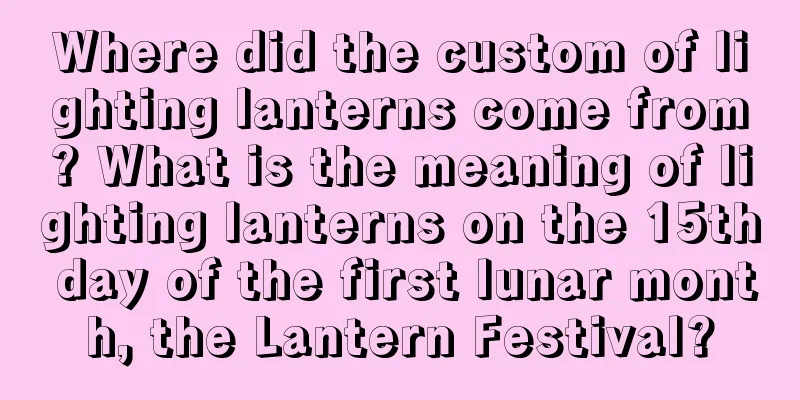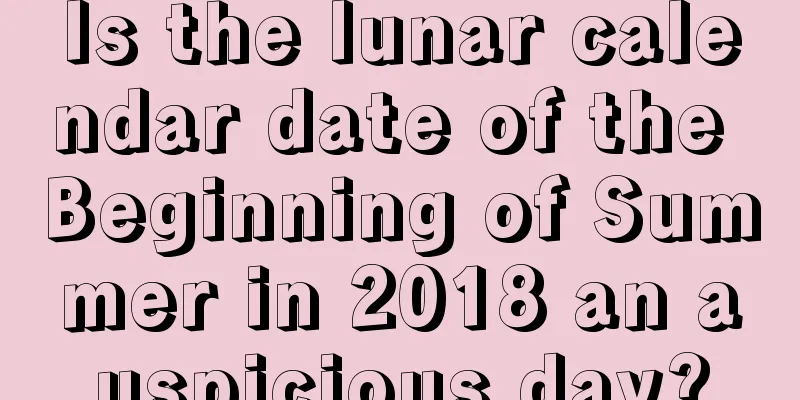Where did the custom of lighting lanterns come from? What is the meaning of lighting lanterns on the 15th day of the first lunar month, the Lantern Festival?

Introduction: The Lantern Festival is a very important day in our Lunar New Year, and the Lantern Festival also has many customs, lighting lanterns is one of them. So what is the meaning of lighting lanterns on the fifteenth day of the first lunar month, the Lantern Festival? What is the origin of the custom of lighting lanterns? Now, let’s follow the editor to learn about it. A year's plan begins with spring, and the Spring Festival is an important traditional festival of ours. Do you want to know more about the Spring Festival? Come and take a look at the Spring Festival special topic carefully prepared by Mr. Shui Mo!The Origin of the Custom of Lighting Lanterns on the Lantern FestivalDuring the Yongping period of Emperor Ming of the Han Dynasty, Emperor Ming promoted Buddhism. Coincidentally, Cai Yin returned from India after seeking Buddhism. He said that on the fifteenth day of the first lunar month in the Indian kingdom of Magadha, monks gathered to pay homage to the Buddha's relics. It was an auspicious day to visit the Buddha. In order to promote Buddhism, Emperor Ming of Han ordered that lights be lit in the palace and temples to honor Buddha on the fifteenth night of the first lunar month. From then on, the custom of lighting lanterns during the Lantern Festival spread from being only held in the palace to the common people. That is, every fifteenth day of the first lunar month, both nobles and common people would hang lanterns, and cities and towns would be brightly lit all night long.The custom of lighting lanterns during the Lantern Festival developed into an unprecedented lantern fair in the Tang Dynasty. At that time, the capital Chang'an was already the largest city in the world with a population of one million and a prosperous society. Under the emperor's personal advocacy, the Lantern Festival became more and more luxurious. After the middle Tang Dynasty, it has developed into a carnival for the whole nation. During the Kaiyuan Period (685-762 AD) of Emperor Xuanzong of Tang, the Lantern Festival in Chang'an was grand in scale, with 50,000 lanterns lit and a wide variety of lanterns. The emperor ordered people to build a giant lantern tower, which was 20 rooms wide and 150 feet high. It was dazzling with golden light and extremely spectacular. In the Song Dynasty, the Lantern Festival surpassed that of the Tang Dynasty in terms of scale and the fantasy and exquisiteness of the lanterns. The activities were more folk-oriented and had stronger national characteristics. In the following generations, the Lantern Festival continued to develop and the duration of the festival became longer and longer. The Lantern Festival in the Tang Dynasty was "one day before and after the Lantern Festival". In the Song Dynasty, two days were added after the 16th. In the Ming Dynasty, it was extended to a full ten days from the 8th to the 18th. In the Qing Dynasty, the Manchus took control of the Central Plains and the palace no longer held lantern festivals, but folk lantern festivals were still spectacular. The date was shortened to five days and continues to this day. In Taiwan, lanterns represent brightness and the birth of a new child. Lighting a lantern means illuminating the future. In Taiwanese, the homophones of "lantern" and "ding" represent the birth of a boy. Therefore, women in the past would deliberately walk under the lanterns during the Lantern Festival, hoping to "drill under the foot of the lantern to give birth to an egg". There are many legends about the origin of the Lantern Festival among the Han people: Legend about the origin of the Lantern Festival: Emperor Yang of Sui was obsessed with sex and wanted to marry his sister. The younger sister couldn't resist and said that they could only get married if a miracle happened on the fifteenth day of the first lunar month with the ground covered with stars. Emperor Yang of Sui ordered the people living near the capital to light lanterns in every household on the evening of the 15th. Anyone who disobeyed the order would be beheaded. On the evening of the 15th, the younger sister went up to the tower and saw lights all over the floor. She mistakenly thought that they were falling stars, so she jumped into the river and committed suicide. In order to commemorate this woman who refused to be humiliated, the Han people light lanterns on the fifteenth day of the first lunar month every year. Legend 2 about the origin of the Lantern Festival: The Lantern Festival originated from Emperor Wu of Han. At that time, the palace maids missed their parents after the Lantern Festival in the first month of the lunar calendar, but the palace was strictly forbidden, so how could they go out to meet them? Dongfang Shuo, a resourceful man, felt very sympathetic when he heard about it, and planned to help them. He first spread a rumor that the God of Fire would send people to burn down Chang'an City, causing panic in the city and the palace. Later, he suggested to Emperor Wu that on the night of the 15th all the palace staff should go out to avoid the disaster, and red lanterns should be hung on the streets, alleys, courtyards and doors of the houses throughout the city, as if the whole city was on fire, in order to deceive the God of Fire who was watching from the sky. Emperor Wu agreed, and the palace maids took the opportunity to meet their families during the Lantern Festival. From then on, lanterns would be lit on the fifteenth day of every first lunar month. Summary: Through the above article content, we know the meaning of lighting lanterns on the Lantern Festival on the 15th day of the first lunar month and the origin of the custom of lighting lanterns. I wish you all good luck and prosperity in the new year! After reading this article, there are more exciting content in the Spring Festival special topic, let’s take a look! |
<<: Where is the direction of the God of Happiness on the 14th day of the first lunar month in 2017?
>>: What day is the 14th day of the first lunar month? What are the customs and taboos?
Recommend
Will the feng shui effect of the locust tree attract dirty things?
Introduction: We often see locust trees planted i...
When is it possible to get engaged on Arbor Day 2022? What are the precautions?
In fact, engagement refers to the conclusion of a ...
Is April 29th of the lunar calendar 2021 an auspicious day for a haircut? What does the hexagram look like?
April is the beginning of summer, when golden whea...
Is the fate of a boy born on March 12, 2019 in the lunar calendar good?
Is the fate of a boy born on March 12, 2019 in the...
When is the National Day in 2020? Is it an auspicious day or an unlucky day?
Introduction: It’s National Day again in a blink o...
Analysis of the 15th day of the fifth lunar month in 2022. Is it a good day to hold a funeral?
The good and bad days in the lunar calendar are di...
Where is the God of Wealth on the sixth day of the sixth lunar month in 2017? Check the God of Wealth's location
The arrival of the leap month of June in the luna...
Can I set up the bed on the 27th day of the twelfth lunar month in 2021? Do you know the twelfth lunar month ballad?
If you want your new home to have good feng shui, ...
What should I wear on Dragon Boat Festival? What is the meaning of wearing colorful ropes during the Dragon Boat Festival?
The Dragon Boat Festival is one of China's tra...
Is it possible to have a caesarean section on March 22, 2022 in the lunar calendar? What is the hexagram like on this day?
The arrival of the third month of the lunar calend...
Query of auspicious time and inauspicious time for October 17, 2018
The tenth month of the lunar calendar is a new mo...
Can I get married on the tenth day of the second lunar month in 2019? Can I get engaged and hold a wedding?
If you want to know more about the second month o...
What is the fate of a tiger baby born on the 15th day of the eighth lunar month? Is your personality approachable?
Introduction: Mid-Autumn Festival is a good day fo...
Is the day before the Rain Water in 2020 an auspicious day for sacrifice? At what minute and second will the Rain Water start in 2020?
Introduction: It is also necessary to choose an au...
A complete list of names for rat babies born in leap April 2020! (boy + girl)
New life is born every year, and in 2020, the Year...









